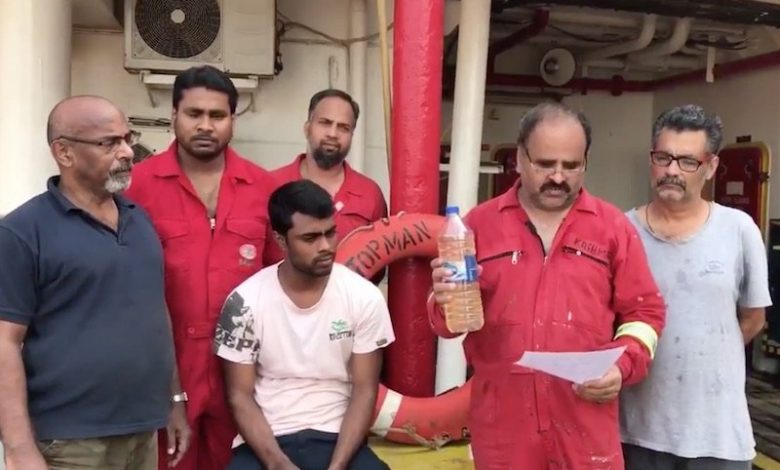Crew abandonment cases spike

Cases of crew abandonment are not diminishing despite greater global attention being paid to the nasty practice.
Worldwide, 4,866 seafarers on a total of 336 vessels have been recorded as abandoned onboard ship, in records kept by the International Maritime Organisation (IMO) and the International Labour Organisation (ILO) since 2004. In 2018, 791 sailors on 44 ships were abandoned, while in 2017 a total of 55 instances were reported, according to the IMO/ILO database. In the previous five years, an average of just 12 to 17 ships a year were abandoned. As of the end of March, the database has recorded 13 ships where crew have been abandoned this year, suggesting 2019 will be another year with an above average figure of crew abandonment cases.
Some member states at the IMO have recently indicated that they would submit proposals for guidelines on cooperation between flag and port states to resolve abandonment cases to the next session of the IMO’s legal committee.
Jasmin Fichte, managing partner at UAE law firm Fichte & Co, has been fighting cases of crew abandonment for years. Last week her company helped get crew stuck on one disintegrating ship for nearly three years, back onshore and repatriated.
Fichte told Splash UAE salary payment laws onshore could work at sea, creating a blacklist system to stamp out crew abandonment.
“MLC has improved the situation, however, it is still far to easy for shipowners to let down the crew and the IMO needs to react,” Fichte said, adding: “In the UAE we need to pay staff salaries via a government instrument to ensure prompt payment. Any breach will lead to an automatic blacklist. The same should happen to shipowners. Leaving crew on an abandoned and unseaworthy vessel is criminal and should be treated as such. And these kind of shipowners should be on a name to shame list so seafarers can check the credentials before signing on.”
New guidance has been published recently to assist welfare organisations dealing with incidents of seafarers being abandoned and vessels being arrested or detained.
The booklet, entitled Arrested and Detained Vessels, and Abandoned Seafarers, has been produced by the International Seafarers’ Welfare and Assistance Network (ISWAN) in partnership with InterManager, the International Chamber of Shipping (ICS), the International Christian Maritime Association (ICMA) and the International Transport Workers’ Federation (ITF).
Arrested and Detained Vessels, and Abandoned Seafarers aims to assist port welfare committee members and welfare agencies in reviewing best practice in these situations. The new guidance outlines the responsibilities of the authorities and other organisations that might become involved when problems are identified aboard a vessel whilst in port.
Natalie Shaw, director employment affairs at ICS, commented: “In cases of abandonment it is often difficult for affected parties to know what needs to be done, who needs to be contacted and how progress can quickly be made to get seafarers returned home in a short time. It is hoped that if parties involved in supporting affected seafarers follow the advice contained in this document, cases will be able to be resolved much quicker to the benefit of both the affected seafarers and their families.”
Dave Heindel, chair of the ITF Seafarers’ Section, said at the launch of the booklet earlier this month: “No seafarer should have to go through the experience of abandonment. Unfortunately, the rate of abandonments around the world remains high and difficulties in resolving these cases persist. Given the hardship faced by abandoned seafarers, it is crucial that assistance is provided as quickly as possible. We hope that this guidance will help concerned parties in providing this assistance as we work towards eliminating the scourge of abandonment.”
Splash readers can download the Arrested and Detained Vessels, and Abandoned Seafarers booklet by clicking here.

nice hidden commercial there for a law firm.
In our experience FTA did a great job, lawyers are next to useless in such circumstances. Ports have swelling PDAs and agents are running scared of liabilities. Unless of course crew want to sue their owner once they get disembarked.
Oops! Wrong link Sam.
Sam, the MLC now obligates owners to have P&I insurance to ensure the repatriation of seafarers plus an element of lost wages. Evidence of the owner’s compliance with this requirement must be posted in a public space on board. So why is this not working in relation to the abandonment cases you report? is it because the flag states of the ships involved have not ratified the MLC? Would be great to learn more from Jasmin Fichte on this issue as I believe the UAE is a flag state that has not ratified the MLC.
Good Day !
They talking about some situations.
I was thinking also that they will remember the situațion of m/v “SOTRA” and her crew which was repatriated after three months (in 2017, when the vessel was detained without any crew`s fault).
I was also thinking that will help the crew to be paid.
Now are almost two years since bad situation, two years since ALL crew, at home, waiting wages.
So…where is the above named “help” ???
Thanks for reading My message !
(Captain) Viorel Moga
Romania